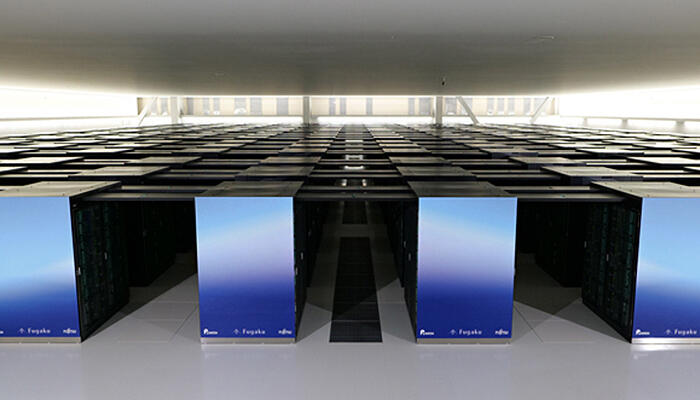RIKEN's supercomputer Fugaku has been ranked first in the "HPCG (High Performance Conjugate Gradient) Benchmark" and "Graph500" supercomputers for eight consecutive terms, fourth in the "TOP500," and third in the "HPL-MxP." This announcement was made at SC23, an international conference on high-performance computing (HPC).

Provided by RIKEN
Fugaku was developed based on the concept of co-design, enabling the execution of various applications with low power consumption while ensuring high performance. It has been generating various outcomes in fields such as life sciences, disaster reduction, energy, manufacturing, basic science, and socioeconomics through digital twins and similar technologies at the level of societal implementation.
Amidst the development of new machines by overseas entities such as the U.S., Fugaku has continued to receive high rankings in multiple fields involving supercomputers for over three years. This indicates that Fugaku maintains strong international competitiveness as a foundation of Japanese R&D.
Currently, RIKEN is working on "Virtual Fugaku," which reproduces a software environment equivalent to that of Fugaku on hardware other than Fugaku and on cloud services. Through this project, RIKEN aims to make the rich software environment of Fugaku available to any user in the world.
Additionally, "AI for Science" is attracting worldwide attention as an initiative that aims to create new innovations in scientific research through AI. To this end, RIKEN contributes to enhancing AI research capabilities in Japan by developing a distributed parallel learning method employing a large-scale language model using Fugaku and various applications utilizing AI and simulations. Furthermore, to expand the computable area, they are developing system software that links quantum computers (QC) and HPC for the full-scale use of QC and build a platform for quantum research.
RIKEN will continue its research on next-generation systems in the post-Fugaku era based on these studies, aiming for the early realization of the research DX. To this end, they have been engaged in a research project on next-generation computing infrastructure (system survey research) since August 2022. This project is supported by the Ministry of Education, Culture, Sports, Science and Technology (MEXT).
The research aims to propose feasible solutions such as systems that can realize Society 5.0, taking into consideration the needs of science, the industry, and the society. Furthermore, they are aiming at achieving the ideal form of the future research DX by surveying the architecture, system software libraries, and applications of the next generation computing infrastructure and examining elemental technologies. They will clarify the performance and functional requirements expected to be present in the next-generation computing infrastructure while determining technical challenges and constraint factors. In this research project as well, the knowledge and capabilities cultivated through the development of Fugaku and its applications will be fully utilized.
Director Satoshi Matsuoka of the RIKEN Center for Computational Science said, "Fugaku began its trial operation in the first half of 2020. Since then, it has made its appearance in the world's major supercomputer performance rankings every six months, marking its eighth appearance so far. In terms of actual application performance, it has demonstrated its excellence by securing the top spot in HPCG (the most crucial benchmark for HPC), as well as in Graph500 (a big data benchmark). Additionally, it holds the fourth position in the traditional TOP500 benchmark and ranks third in HPL-MxP (an AI benchmark), indicating its world-class comprehensive capabilities. While new supercomputers are being developed worldwide, with numerous new entries in each ranking cycle, the fact that Fugaku continues to maintain its position among the world's best systems over a four-year period is, in my opinion, a testament not only to the inherent technological prowess of the original hardware but also to the continuous efforts in the R&D on the software front at this center, aiming for performance enhancements."
"Indeed, in this latest ranking, Fugaku further extended its lead in Graph500 and maintained its position among the world's best in HPL-MxP, a newly established benchmark for large-scale AI introduced after the completion of Fugaku. Such ongoing recognition milestones across diverse benchmarks indicates the successful realization of Fugaku's development strategy, which is aimed at broad utilization across various fields. While the center's capabilities, nurtured by Fugaku, are reflected in these rankings, the insights gained are also being applied in the considerations for the next-generation supercomputer R&D that is already underway at this center."
This article has been translated by JST with permission from The Science News Ltd. (https://sci-news.co.jp/). Unauthorized reproduction of the article and photographs is prohibited.




